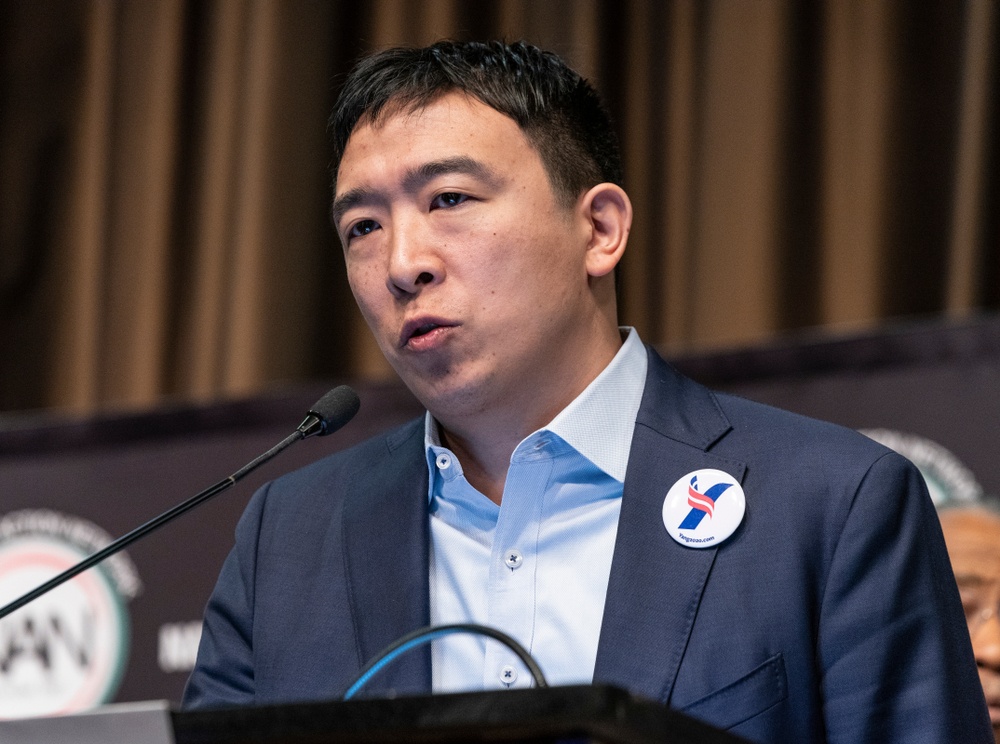Pro-Bitcoin Presidential Candidate Andrew Yang Slams ‘Onerous’ Bitlicense

2020 presidential candidate Andrew Yang has called for 'clear federal guidelines' on cryptocurrencies. | Source: Shutterstock
By CCN.com: 2020 Democratic presidential candidate Andrew Yang believes that “clear” regulations are needed for cryptocurrencies, and he specifically calls the Bitlicense “onerous” on his crypto policy page.
Aside from John McAfee and other third-party candidates, Yang’s statements on cryptocurrency are probably the most positive we have seen in a presidential candidate.
Clearer Regulations Needed
Yang’s page says:
Currently, different departments of the federal government consider digital assets as property, commodities, or securities. Some states have onerous regulations in the space, such as NY’s BitLicense. Navigating this has had a chilling effect on the US digital asset market.
The Bitlicense has long been a subject of ridicule among cryptocurrency enthusiasts. The aggressive regulation package controls every aspect of crypto business in ways that many see as unfair. The regulations even dictate which cryptocurrencies a crypto firm can transact in – which is why the Gemini exchange supports so few assets.
It’s time for the federal government to create clear guidelines as to how cryptocurrencies/digital asset markets will be treated and regulated so that investment can proceed with all relevant information.
Yang is one of the few presidential candidates in history to accept crypto donations. Yang said in a recent interview with Ben Shapiro that he made his name by heading up an education company that eventually became the top one in the country.
End of the Bitlicense In Sight?
Yang believes that cryptocurrency is an industry that has had trouble thriving in the United States as a result of conflicting and confusing legislation. His policy commentary mentions the recently re-introduced Token Taxonomy Act, which some say there are inherent problems within. He seems to believe that Wyoming has the most sensible legislation regarding cryptocurrency. Andrew Yang pledges to:
Work with the sponsors of the Token Taxonomy Act and Wyoming legislators to promote the above, largely modeled after their work.
One of those sponsors is, of course, fellow candidate Tulsi Gabbard.
A “clearer” regulatory environment is something that many crypto executives have long called for. After New York introduced its Bitlicense, California and other states attempted to do the same. The Bitlicense has taken most companies years to receive. On the flip side, Bakkt sees it as one way to get around federal regulations.
Bittrex, one of the longest-lasting altcoin exchanges, was recently denied a Bitlicense . Bittrex responded:
First, and foremost, we adamantly disagree with NYDFS’ claims and allegations in regard to our anti-money laundering (AML) and compliance practices. Corporate responsibility is in our DNA and our commitment to regulatory and compliance guidelines is second to none.
Bittrex Loses Bid for Bitlicense
While several problems were listed, New York didn’t mention the fact that Bittrex lists dozens of small market cap assets. Instead, New York told Bittrex they could only list ten coins for New York users.
The agreement restricted the coins we could offer to New York residents to only ten coins, and imposed restrictions on the process by which Bittrex could offer new coins. This would have prohibited Bittrex from listing coins that are offered to New York residents by other bitlicensees. NYDFS reserved the right to order us to withdraw coins at any time. Additionally, DFS would be able to prohibit offering tokens to NY residents, even if other NY bitlicense holders were able to offer the tokens.
From a public relations perspective, Bittrex might have been better off never applying for a Bitlicense than being denied one.
Do States Have the Right to Regulate Crypto?
The implications of the Token Taxonomy Act and similar regulations do call into question the future of “onerous” regulations like the Bitlicense. Part of the Act severely restricts the ability of states to regulate cryptocurrencies, although it also specifically empowers them to fight fraud of any kind. At the same time, this calls into question the viability of legislation like it – will representatives from New York and other states defend their local governments’ rights to “overreach,” in the words of Bittrex?
For Yang’s part, he’s attracting a voting bloc that may otherwise have had no interest in him. CCN.com’s own Nick Marinoff has elucidated the feelings of young conservatives rather well. In Donald Trump’s nearly three years in office, nearly nothing positive has been done at the federal level regarding cryptocurrencies.